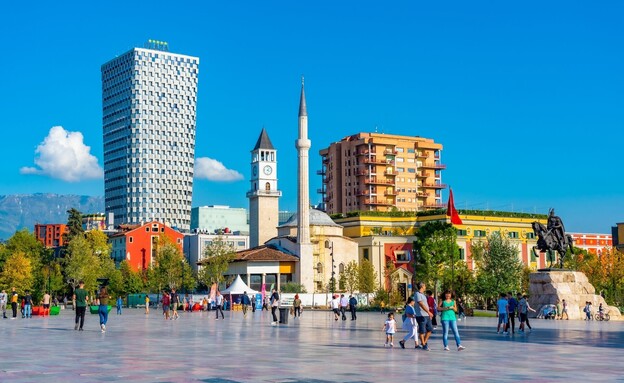Edi Rama, the Prime Minister of Albania , wears a yellow ribbon ️ in support of the Israeli hostages held by Hamas during his speech at the United Nations. pic.twitter.com/mm6kqfI5Vf
— Israel Foreign Ministry (@IsraelMFA) September 28, 2024
In recent years, relations between Israel and Albania have been getting tighter, with the two countries finding common ground in various areas of cooperation. This partnership, although it does not always receive the spotlight among Israel’s many international relationships, has deep historical roots and continues to develop in the face of current challenges, alongside the fact that Albania is the only country in Europe with a Muslim majority.
An unexpected alliance: Israel and Albania – from the Holocaust to today
The relationship between Israel and Albania began even before Israel was founded, during the Second World War, a period when Albania stood out as the only European country where there were more Jews at the end of the war than at the beginning. During World War II, Albania became a rare beacon of hope for Jews in Europe, as the country’s Muslim and Christian communities actively protected Jewish refugees and protected them from Nazi persecution. Under the Italian occupation from 1939 and then under German control, many Jews sought refuge in Albania, escaping the atrocities taking place throughout the continent.
Unlike many European countries, Albania did not respond to the demands of the Nazi regime to deport its Jewish population. Instead, Albanian citizens often went to great lengths to protect their Jewish neighbors. The concept of “Besa”, an Albanian cultural principle meaning “faith” or “trust”, played a crucial role in this period. According to Bassa, providing protection to those in danger is a duty, and many Albanians risked their lives to hide Jews, offering them shelter in their homes.
As a result, Albania became one of the few countries in Europe where the Jewish population grew during the war. It is estimated that almost all of the approximately 1,800 Jews who lived in Albania before the war survived, and many eventually fled to safety in Italy, and most immigrated to Israel after the war. This act of solidarity and humanity left a lasting legacy in Albania, contributing to relations with the Jewish community. After the war, Albania established diplomatic relations with Israel in 1949.
The fall of communism in Albania in the early 1990s led to the renewal of diplomatic relations with Israel. In 1991, Albania opened an embassy in Tel Aviv, marking a new chapter in bilateral relations. The revival of ties coincided with the expansion of Israel’s diplomatic reach in Eastern Europe, in search of new partners in the post-Cold War landscape.
Since then, the two countries have participated in a large number of high-profile visits, such as that of President Yitzhak Herzog in Albania last month, and have strengthened their diplomatic relations. As mentioned, the Prime Minister of Albania, Edi Rama, is an enthusiastic supporter of Israel, promotes cooperation in various sectors and expresses strong pro-Israeli feelings. Under the leadership of Rama, a Catholic Christian, Albania maintains a consistent stance against anti-Israeli sentiments in international forums, and has demonstrated a commitment to stand by Israel on crucial issues, especially in the face of Iranian influence in the region.
It is also important to note that relations between Israel and Albania have strengthened against the background of the fact that there are extremely tense relations between Albania and Iran. Relations between the two Muslim countries reached an unprecedented low following a widespread cyber attack in July 2022, which caused Albania to cut diplomatic ties with Iran and accuse it of an act of aggression. Iran strongly denied the accusations, claiming that they were motivated by political considerations. Tensions between the two countries intensified due to Albania’s hosting of Iran’s Popular Mujahideen, a group that Tehran considers a terrorist organization.
From beach tourism to counter-terrorism
In recent years, Albania has become a leading tourist destination in the Balkans, and it is as a result of the work that it is only now beginning to discover the benefits of the global tourism industry and its enormous economic contribution. According to the Albanian Ministry of Tourism, the number of tourists in the Balkan country increases by about 40 percent each year, and by the end of 2024, Albania expects that nearly 14 million tourists will visit the country. Among the visitors to the country are also many Israelis, who discovered Albania as a destination with low prices and many natural treasures.
Aleksandar Todorovic, shutterstock
Beyond tourism, trade between the two countries has experienced consistent growth, with Albania exporting goods such as minerals and agricultural products to Israel, while Israel exports machinery, technology and medicine to Albania. In recent years, Israeli companies have invested in various sectors in Albania, including energy, agriculture and tourism. Albania’s strategic location in the Balkans makes it an attractive partner for Israel, especially for access to European markets. Israeli entrepreneurs and investors increasingly recognize Albania’s potential as a gateway to Europe, which leads to joint ventures and projects that benefit both countries.
One of the most important areas for both countries, if not the most important, is security cooperation, a cornerstone of Israel-Albania relations. The two countries share concerns about regional stability and terrorism, and are engaged in joint efforts to improve their security frameworks. Israel has provided Albania with intelligence sharing, military training and counter-terrorism support. In recent years, Albania has participated in NATO missions and operations (joined in 2009), and its partnership with Israel has increased its capabilities in this regard. Israeli military experts have provided training to Albanian forces, emphasizing the importance of modernizing military operations in response to threats.
